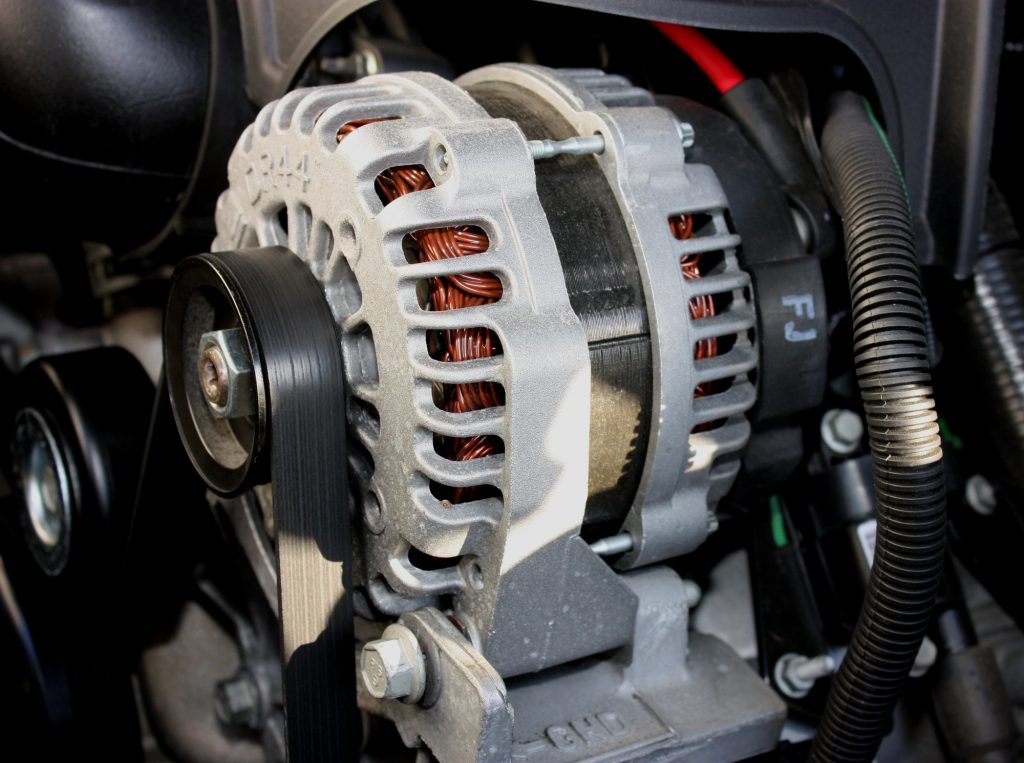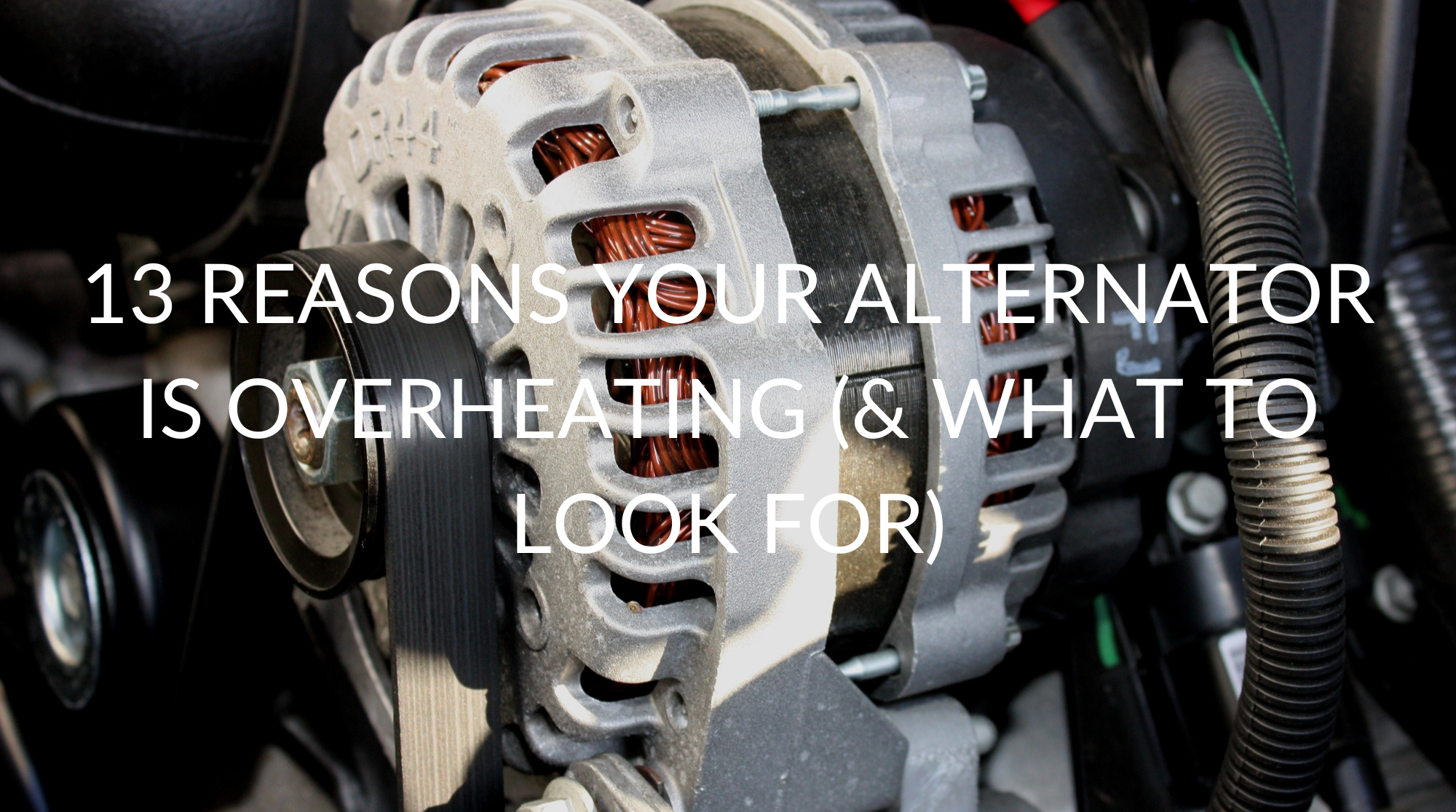If your alternator is overheating, then you may then you’ve found the right article. In this article, not only will you find out what causes an alternator to overheat, but you’ll also learn the symptoms to watch out for, how to fix the issue when possible, and what to do if you can’t fix it yourself!
So keep reading to find out everything you need to know!
What Causes An Alternator To Overheat?
There are a whole range of things that could be causing your car’s alternator to overheat. So if you notice that the alternator is a lot hotter than usual, make sure you’re checking for the following things:
The Connections Between The Alternator And Battery Need Cleaning
If your alternator is overheating, it could be that the connections between the alternator and battery are not as clean as they should be.
These connections need to be free of corrosion and any other build-up that might impede electrical power flow. Ensure these connections are cleaned regularly to avoid alternator overheating problems.
Alternator Diodes Have Stopped Working
If one or more of the diodes in your alternator have stopped working, then the alternator is going to have to work much harder to keep up with the higher load some batteries are going to need to get fully charged.
Bad Grounding
If the alternator is not properly grounded, then it could cause extra strain on the alternator, resulting in overheating.
Check that all connections are secure, and make sure to check for corrosion as well, since even a tiny bit of build-up can lead to alternator overheating.
The Casing Vents Are Blocked
The alternator needs to be able to vent the heat generated during operation, so if anything is blocking these vents, then it can cause the alternator to overheat. Check your alternator for any build-up or obstruction that could be causing issues with its cooling system.
Damaged Battery
Damaged batteries can cause alternator overheating, as the alternator has to work harder to keep up with a malfunctioning battery. Check your battery for any signs of damage and if necessary, replace it with a new one.
Poorly Tensioned Belts
If the alternator belt is too tight or too loose, then it’s going to cause extra strain on the alternator. Check and adjust the alternator belt tension regularly to avoid alternator overheating issues.

Bad Alternator Bearings
If the alternator bearings are worn out or damaged, then it could be causing extra strain on the alternator and lead to overheating. Have a qualified mechanic check the alternator for any signs of damage and replace it if necessary.
A Faulty Voltage Regulator
If the alternator has a faulty voltage regulator, then it could be causing the alternator to work too hard. Have a qualified mechanic check for any signs of damage and replace them if necessary.
Poor Air Circulation
If the alternator’s air circulation is poor, the alternator is going to overheat much more quickly. So make sure nothing is blocking air circulation around your alternator and the rest of the engine.
The Alternator Cooler Fan Isn’t Working
If the alternator cooler fan isn’t working, then it won’t be able to effectively cool the alternator. Have a qualified mechanic check for any signs of problems with the alternator and replace them if necessary.
A Poor Quality Alternator
If you have a poor-quality alternator, then it may simply not be fit for your car. This often happens when an alternator needs replacing, and a cheaper model is bought, or a part that isn’t specifically from the manufacturer.
An Undersized Alternator
If you have an alternator that’s undersized, then it won’t be able to keep up with the electrical needs of your car and will lead to alternator overheating. Have a qualified mechanic check for any signs of problems and replace them if necessary.
A Faulty Alternator
If the alternator isn’t working correctly, then it could be causing the alternator to overheat. Once again, the best thing you can do is take your car to the mechanic to get the issue fixed as soon as possible.
What Are The Symptoms Of An Overheating Alternator
Fortunately, if your alternator is overheating, you’re going to know about it. So when you’re looking for signs, make sure you’re looking for the following:
There’s A Smell (Like A Hot Wire Or Electrical Fire)
If you smell a pungent burning odor, then it’s likely that your alternator is overheating.
A Change In Color Of The Alternator Shaft
If the alternator shaft is turning a different color, then it could be a sign of the alternator overheating. Normally, you’ll notice the alternator shaft changing to a darker colour than it was previously.
Smoke Comes From The Alternator
If you start to see smoke coming from your alternator, then it’s likely that it is overheating. Have your alternator checked out and replaced if necessary.
The Label Is Burnt
If the label near the alternator is burnt, then it’s likely that alternator overheating has occurred. Have your alternator checked out and replaced if necessary.
Your Vehicle Is Overheating
If your vehicle starts to overheat, then it could be due to the alternator overheating. Check for any of the signs mentioned above, and then take it to a qualified mechanic to have the alternator fixed.
How Do You Fix An Overheating Alternator?
If you know that your alternator is overheating, then here are the things you can do to fix the issue: But remember, taking your car to the mechanic is the best thing you can do.
Get The Alternator Checked By A Mechanic
The best thing you can do is take your alternator to a qualified mechanic. They’ll be able to determine what’s causing the alternator to overheat and make the necessary repairs.
Adjust The Alternator Belt Tension Regularly
If the alternator belt tension is off, then it could be causing extra strain on the alternator and lead to overheating. Make sure to check the alternator belt tension regularly and adjust it if necessary.
Replace Damaged Alternator Parts
If any parts of the alternator are damaged, then they need to be replaced as soon as possible. Have a qualified mechanic check for any signs of damage and replace them if necessary.
Turn Off Unnecessary Electrical Loads
If you turn off any unnecessary electrical loads when your alternator is running, then it will reduce the strain on the alternator and help prevent alternator overheating.
Make Sure The Vents Aren’t Blocked
If the alternator vents are blocked, then air circulation is going to be limited. Make sure that air can move freely around your alternator and the rest of the engine.
Check The Groundings And Connections
If the alternator groundings and connections are loose or corroded, then it could be preventing the alternator from working correctly. Have a qualified mechanic check for any signs of corrosion or looseness and replace them if necessary.
Replace The Alternator
Finally, if the alternator is beyond repair, then you may have to replace it. A new alternator will be better suited for your car and should help prevent the alternator from overheating.
FAQ
Here are some frequently asked questions that people have about their cars alternator overheating.
How Hot Should An Alternator Get?
Alternators can get as hot as 200 degrees Fahrenheit without causing any damage to your vehicle. However, if your alternator is getting hotter than this, then it’s likely that there is an issue with the alternator, and you should have it checked out by a qualified mechanic.
Can Overheating Damage An Alternator?
Yes, alternator overheating can cause damage to the alternator. This could lead to decreased performance and even failure of the alternator. Therefore it’s important to have your alternator checked if you experience any signs of alternator overheating.
Is It Normal For An Alternator To Be Hot?
It is normal for alternators to get hot; however, if it’s getting extremely hot then it could be a sign of alternator overheating.
Can A Bad Alternator Cause Overheating?
Yes, a bad alternator can cause it to overheat. The alternator may not be able to handle the load it is being asked to carry, and this could lead to it overheating.
Why Is Your Alternator Getting Hot And Smoking?
If your alternator is getting hot and smoking, then it could be caused by a range of things, such as damaged alternator parts, loose connections, or incorrect alternator belt tension.
Why Does Your Alternator Get Hot When Charging The Battery?
It’s normal for alternators to get hot when charging the battery; however, if the alternator gets too hot, then it’s because it’s working harder than usual to charge the battery. This could be due to a weak battery, alternator belt tension being off, or even damaged alternator parts.
Recap
Alternator overheating can be caused by a range of issues, including alternator belt tension, alternator parts being damaged, or even a weak battery.
If you’re experiencing alternator overheating, then it’s important to have it checked out by a qualified mechanic as quickly as possible.
Regularly adjusting the alternator belt tension and replacing any faulty alternator parts can help prevent alternator overheating. Additionally, try to avoid using unnecessary electrical loads and make sure the alternator vents are clear for good air circulation.
By following these tips, you should be able to reduce alternator overheating and keep your vehicle running safely.

